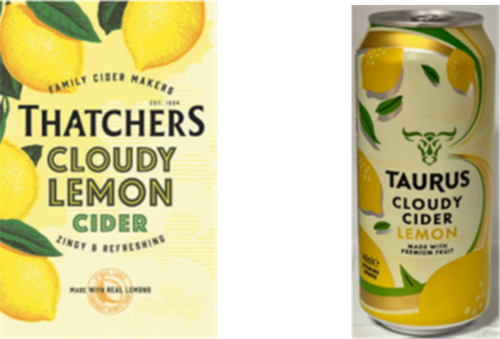25 March 2024
At the end of January 2024, the Intellectual Property Enterprise Court (“IPEC”) delivered its judgment in the action raised by Thatchers Cider Company Limited (“Thatchers”) against Aldi Stores, finding that Aldi had not infringed Thatchers’ trade mark in relation to its cloudy lemon drink and also that it had not passed off its product.
Taking the branding at face value, the decision may be surprising to onlookers and raises questions about the scope and limits of intellectual property rights. It is worth, then, considering what was the rationale for the decision, which provides useful insight into the factors that the court will consider when a brand openly admits using another’s products as a “benchmark” and what might qualify as descriptive or decorative, rather than inherently distinctive.

Thatchers’ trade mark (left) and the Aldi “sign” (right)
Images from the IPEC decision: Thatchers v Aldi FINAL Judgment IP-2022-000076 (judiciary.uk)
The dispute
The basis of Thatchers’ claim was that the overall appearance of the Aldi product was highly similar to that of the Thatchers’ product and that Aldi had intentionally mimicked the appearance of the Thatchers product in creating the Aldi product.
Despite the obvious visual similarities in the branding, Thatchers struggled to articulate what it was about the Aldi product that infringed its trade mark. Aldi raised this in its defence, causing Thatchers to clarify that its case related to “the appearance of the Aldi product as a whole, in comparison with the appearance of the trade mark and of the Thatchers product as a whole”. The Aldi “sign” was ultimately determined to be the overall appearance of a single can (as pictured above). Thatchers did not claim to have any monopoly in the words “Cloudy Lemon Cider” nor indeed in the use of lemons or leaves on lemon cider products. It did however suggest that the Aldi product gave a clear overall impression of similarity to the Thatchers product bearing the trade mark, in particular its use of the limited colour palette of yellows and greens and the background of creamy-yellow.
|
|
In its defence, Aldi accepted that it used the Thatchers product as a “benchmark” when developing the Aldi product. However, it denied infringing the trade mark, relying on Section 11(2)(b) of the Act in terms of which a trade mark is not infringed by “the use of signs or indications which are not distinctive or which concern the kind, quality, quantity, intended purpose, value, geographical origin, the time of production of goods or rendering services, or other characteristics of goods or services”.
The legal position
Thatchers’ claim was framed on the following legal bases:
Section 10(2)(b) of the Act – Thatchers argued that there existed a “likelihood of confusion on the part of the public”, in terms of which i) consumers would mistake the Aldi product with the Thatchers product; and ii) consumers would assume that the Aldi product was manufactured by Thatchers.
In response to this claim, the IPEC judge noted that there was no real evidence of direct or indirect confusion, despite the very high volume of sales of both the Thatchers product and the Aldi product. This was held to be a persuasive factor weighing against the likelihood of confusion, but not determinative. The judge also noted that i) the fact that the average consumer may look at the Aldi product and “bring to mind” the Thatchers product was not sufficient for confusion and ii) the colour palette in question (yellow and green) was ubiquitous to lemon-flavoured drinks. As such, the judge determined that there was no real likelihood that the average consumer would be confused.
Section 10(3) of the Act – Thatchers argued that the Aldi product took unfair advantage of, or caused detriment to, the distinctive character and repute of its trade mark, without due cause. As part of the “unfair advantage” argument, Thatchers did not complain in principle about Aldi’s process of benchmarking a new product to a market leader, which is a recognised marketing practice, but rather that Aldi had significantly departed from standard benchmarking by “not matching” their own house style and deliberately choosing branding similar to the trade mark.
The judge considered whether Aldi had attempted, through use of the sign (which it was agreed was similar to the trade mark) (and which the judge found had a reputation) to take advantage, or “ride on the coat tails of” the trade mark in order to exploit it and gain a benefit from that reputation and the marketing efforts that had been made by Thatchers to promote it. Relevant factors included the fact that there was no evidence that Aldi had any intention to deceive consumers and the fact that Aldi had not departed from its house style, but rather had added lemons and lemon leaves (to communicate the lemon-nature of the contents) but retained the bulls head, the “Taurus” branding and the swoosh, which feature on all Taurus ciders (not just the Cloudy Lemon Cider).
The judge was not ultimately satisfied that Aldi had taken unfair advantage of, or caused detriment to, the Thatcher trade mark. On the contrary, she was persuaded that the use of lemons on the packaging was an obvious marketing strategy, which was clearly effective in communication to consumers that this was a lemon based product. As such, Thatchers’ claim for unfair advantage also failed.
Passing off – Thatchers argued that Aldi had passed off its trade mark by making misrepresentations leading the public, or likely to lead the public, to believe that the Aldi product is that of, licensed of, or approved by, or otherwise connected in trade with Thatchers. The court considered the ‘classical trinity’ of passing off, namely: i) whether Thatchers was the owner of goodwill in the business of sale of the Thatchers product; ii) whether Aldi had made misrepresentations leading to deception or a likelihood of deception; and iii) if so, whether said misrepresentations had caused damage.
The judge held that despite Thatchers being the owner of goodwill in the business of the sale of the Thatchers product, there was no persuasive evidence that any consumers believed that the Aldi product was that of Thatchers – i.e., that the Aldi product was manufactured, licensed or approved by Thatchers. The judge noted that a Tweet produced by Thatchers in which a consumer said “I saw it on @AldiUK shelf and genuinely thought it was @thatchers_cider at first” could be discounted on the basis that the confusion appeared to be “fleeting” and “quickly dispelled”.
The decision
The IPEC judge found for Aldi and dismissed all claims brought by Thatchers. The decision provides useful clarity in relation to ‘lookalike’ products and the marketing industry practice of ‘benchmarking’, which it would appear is on the face of it an acceptable practice provided that there is no intention to mislead the public and that the brand being copied cannot prove consumer confusion.
This decision can be contrasted with the recent Court of Appeal decision in Lidl v Tesco, a dispute about supermarket logos in which Lidl accused Tesco of trade mark infringement, passing off, and copyright infringement. At the centre of the dispute was Tesco’s “Clubcard Price” signs, which comprise a yellow circle on a square blue background, which is similar to the Lidl logo (a yellow circle bearing the word “Lidl” and set against a blue square background). In response to Lidl’s claims, Tesco argued that the use of yellow and / or basic geometric shapes was commonplace in the supermarket sector and that it had due cause to use the colour blue, since it was already part of its “corporate livery”.
The Court of Appeal upheld the lower court’s decision that Tesco’s use of the blue square and yellow circle as a price signifier would mislead enough consumers into believing that Tesco were offering a price match to Lidl by virtue of that use. In relation to confusion, the court was persuaded by a number of factors including warnings raised internally by four Tesco employees, messages from 141 consumers on social media, and oral evidence given during the trial by two members of the public.
Looking ahead
Both cases are significant in the context of trade marks, branding, and lookalike products / promotional materials. The Thatchers case is further authority for the general proposition that trade marks cannot be used to prevent third parties from using descriptive or non-descriptive elements in their branding (for example, lemons for a lemon-based product). Both cases make clear that proving consumer confusion is essential to a successful trade mark infringement / passing off case.
From a practical perspective, it is worth noting that:
- A lookalike product is not necessarily infringing, particularly if the “infringing” elements are non-distinct.
- If claiming trade mark infringement / passing off, it is important to be able to define exactly what it is that is being infringed.
- Proving confusion is not straightforward and will require multiple sources of evidence including that of members of the public. It will also be fact dependent and to some extent determined by the court.
- Benchmarking should nevertheless be approached with caution, in order to avoid potential infringement complaints and (in the case of Tesco’s “Clubcard Price” signs) the requirement to rebrand entirely.
Lauren McFarlane, Associate: lmf@bto.co.uk / 0131 222 2939



